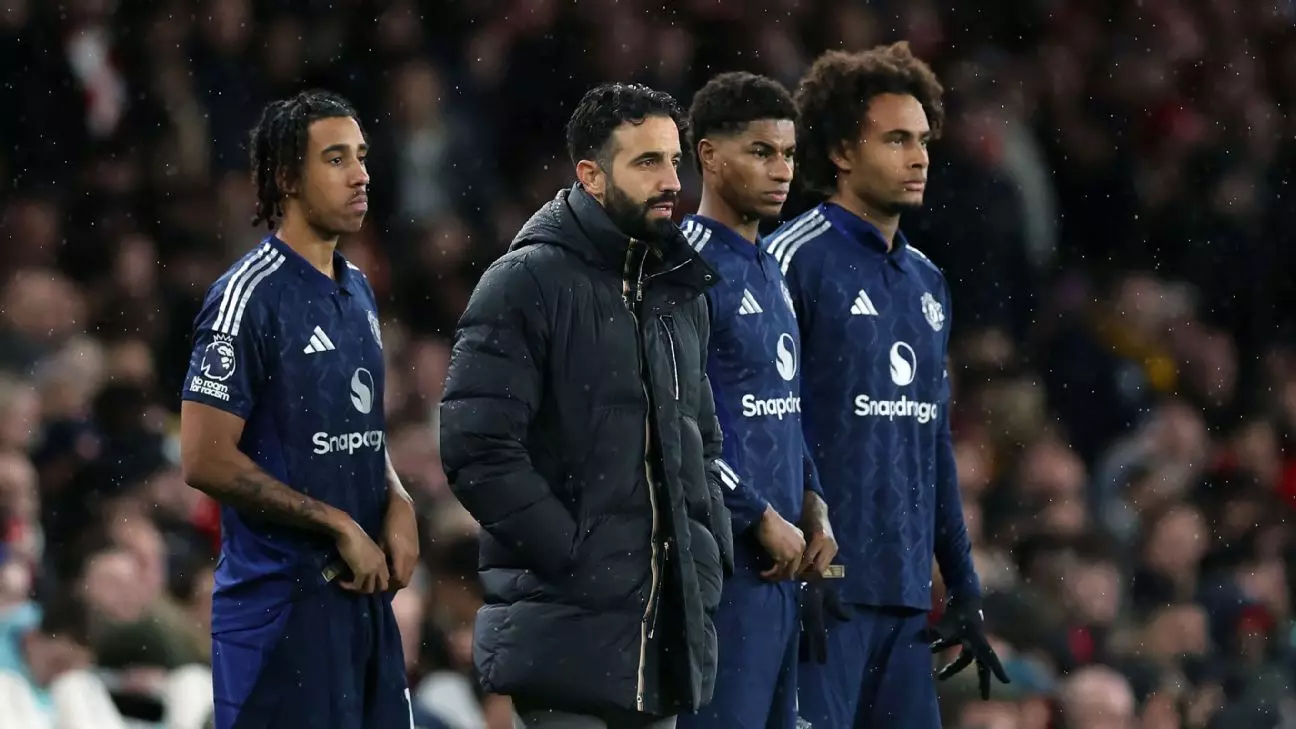As the dust settles on Manchester United’s latest match against Arsenal, the implications of a 2-0 defeat are echoing throughout the club. For manager Ruben Amorim, this marked his inaugural defeat at the helm of Manchester United, following a remarkable year without a league loss. However, the defeat was compounded by a series of pressing factors, specifically injuries within his squad that are evidently straining Amorim’s strategy.
The most glaring issue weighing on Amorim’s mind is the injury list. Key players such as Harry Maguire, Tyrell Malacia, and Mason Mount, who recently returned to the field, were all limited to under an hour of play against Arsenal due to concerns over their match fitness. This conundrum has forced Amorim into a precarious position where he must balance the necessity to win games with the well-being of his players.
Amorim’s approach to player fitness resembles a tightrope walk, where every decision is critical. He acknowledged that each returning player’s fitness level dictates his tactical choices, explaining the constraints imposed by “time limits.” This situation mirrors a common struggle in football management—how to navigate the paradox between demanding immediate results and nurturing recovering athletes back to full strength.
In light of the ongoing injury crisis, Amorim is compelled to adapt not only his player selection but also his tactical approach during games. Following the defeat at the Emirates, he underscored the necessity of modifying strategies to accommodate squad limitations. His assertion that a “different methodology” is required emphasizes the challenges of pressing higher on the pitch while managing the physical exertion of players not yet fully fit.
One must wonder: can such tactical adjustments produce immediate results, or does he risk damaging the team’s overall cohesion? It is well-established in football that constant alterations can lead to disarray on the pitch; thus, even Amorim’s optimistic comments on squad improvement should be tempered with caution.
Despite the loss, Amorim’s steadfast resolve to unveil positives from the match reflects a quality intrinsic to effective leadership. He mentioned assessing the performance beyond mere results. Acknowledging the palpable discomfort of the team in the stadium, particularly at crucial moments of the match, indicates a careful analytical approach that is essential for the future.
However, aspirational rhetoric must translate into actionable strategies moving forward. For Amorim, the task will be how to channel these observations into constructive learning experiences that can be instilled in the players. What did he learn from how the team responded to conceding a goal? If players understand the psychological aspect of transitions, it could prepare them better for similar situations in forthcoming encounters.
A supportive environment can make a world of difference for players working through injuries. Amorim’s commitment to working closely with Luke Shaw, who has faced ongoing difficulties after returning from a prolonged layoff, showcases a caring approach. This individualized focus on player recovery is vital in forging loyalty and confidence within the squad.
Amorim’s recognition of Shaw’s ongoing rehabilitation process harmonizes with modern management techniques that prioritize player well-being. However, there lies a challenge in balancing patience with the mounting pressure for results—the club’s aspirations necessitate urgency, yet the need for player health must remain paramount.
As Amorim takes stock following his first defeat as United’s manager, he is faced with the dual challenge of healing and competing. The road ahead is certainly fraught with difficulties, particularly given the injury concerns that loom large over the squad. Yet, his emphasis on adaptability and player wellness may eventually yield dividends.
The initial loss to Arsenal may not merely be a setback; it could serve as a pivotal moment where Amorim’s leadership is truly tested. Balancing immediate competitive demands with the longer-term objective of nurturing player fitness requires not just tactical acumen but profound resilience. If Amorim can navigate these turbulent waters, Manchester United’s future might still hold promise.


Leave a Reply